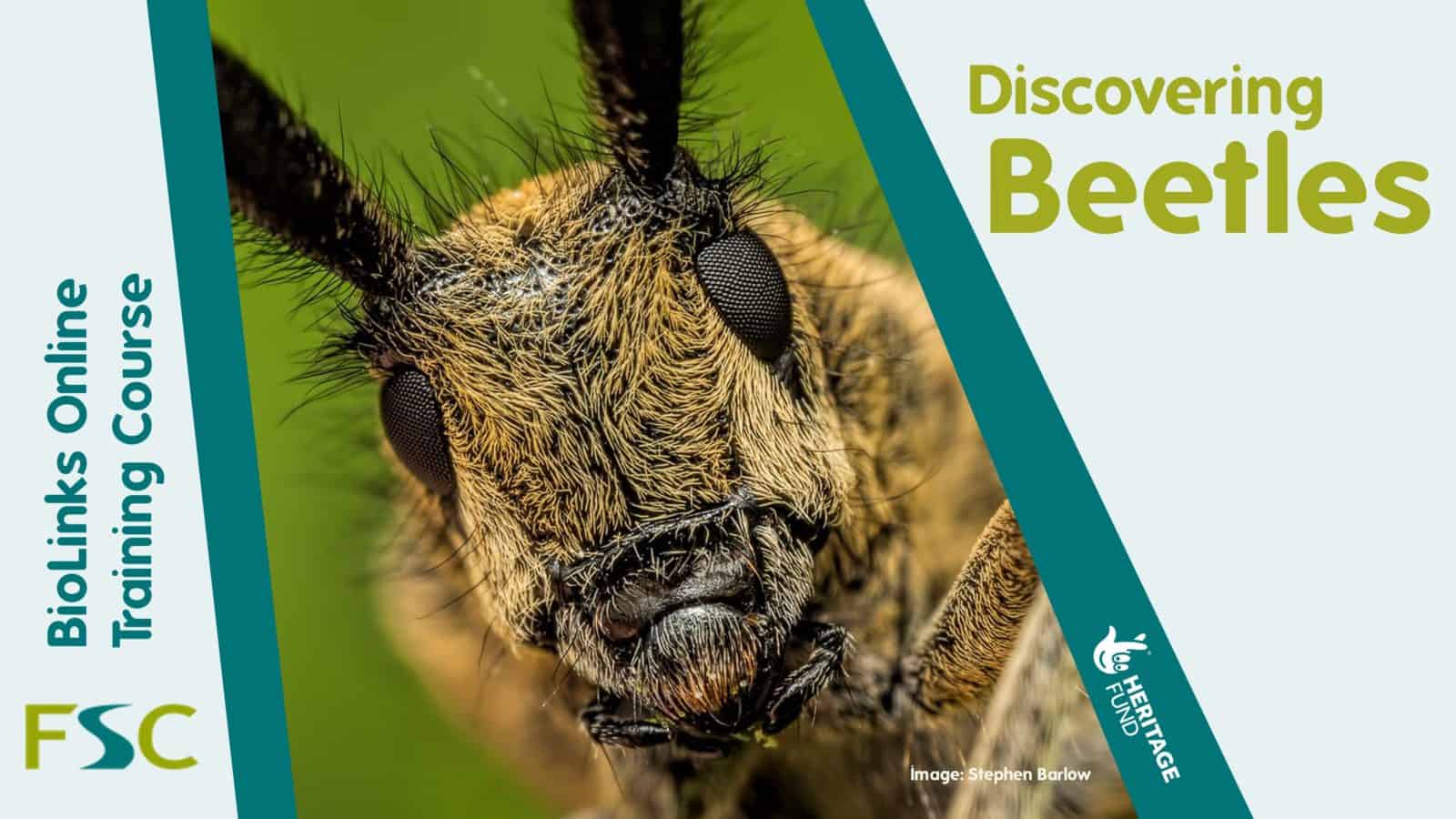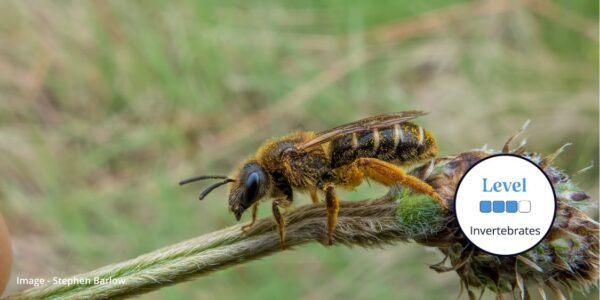THIS COURSE IS NOW CLOSED FOR BOOKINGS
Over 4000 different species of beetles occur in Britain. Their huge diversity in form, behaviour and ecology make them a fascinating group to study and observe but also can make them seem daunting to beginners.
Find out about the lifestyle and varied forms of one of the UK’s most numerous and varied groups of invertebrates. The course will arm beginners with the underpinning knowledge of beetle biology, ecology, behaviour and basic collection methods to embark on their beetle journey.
- 4-week online course for adults, with a weekly time commitment of 3-5 hours per week.
- Access to study content, activities and tutor-graded assignments through the FSC virtual learning platform.
- Access to weekly live virtual classroom sessions at the end of each week with the course tutor through Zoom (recorded for those that are unable to attend the live sessions).
- E-certificate upon course completion.
- Learners will benefit from having access to a 10X hand lens to get the most out of this course.
- Please note that this course is NOT a species identification course and will only go as far as categorising British beetles by their behaviours.
- Please email [email protected] if you have any questions.
This course is aimed at adults only and course attendees must be at least 18 years old in order to attend.
What topics are covered in this course?
- BTL001 Beetle Biology will begin with an introduction to what makes a beetle and look at the internal and external features of beetles as a group, their diversity and learn about their life cycles.
- BTL002 Beetle Ecology will explore the basic ecological functions of beetles and their interactions with their natural environments. This week also features the first of two practical assignments, where learners are asked to explore their local environments and begin to think about the groups of beetles that may be found there.
- BTL003 Beetle Behaviour discuss some notable behaviours which beetles display and their function. We look at feeding-related behaviours of both adults and larvae, survival strategies and courtship rituals.
- BTL004 Finding Beetles will start to bring together the knowledge gained in the last three weeks to help them locate and observe beetles. Learners will look at types of beetle habitat, look at basic collection methods and develop the skills needed to collect and handle beetle specimens without harming them. Learners will also begin to learn and practice the formation of observations to start to build the foundations for the formation of basic identification skills. This topic ends with the last of our practical assignments, to find and make observations of a live beetle specimen.
Course fees
Regular Price: £60 For professionals and residents outside of the UK. Select ‘Attendee (Online)’
Subsidised Price: £20 Subsidised by the FSC BioLinks project for non-professionals eg. volunteers, biological recorders, wildlife gardeners, amateur naturalists and students.Available to UK residents only. Select ‘Attendee Discounted (Online)’
Tutor: Dan Asaw
Dan is a keen educator and Coleopterist. He has experience working within education as a teaching assistant and loves the opportunity to share his experiences and knowledge with a range of audiences. Dan's interest in invertebrates started at a young age and as a teenager he was already rearing praying mantids in his bedroom. From there, he began rearing exotic invertebrate disease vectors for scientific research at the London School of Hygiene and Tropical Medicine.
In his spare time, he has volunteered integrating UK beetles into the Natural History Museum Collection. He is often found digging through wood piles and utilising a variety of trapping methods to find and identify beetles. He is an active member of the Herts Invertebrate project and Hertfordshire Natural History Society, and has helped generate some significant county records in this capacity.
Tutor: Chris Foster
Chris Foster got distracted by beetles while conducting bird surveys for his MSc project and later as a surveyor for the RSPB. Beetles subsequently became the focus of his PhD, which looked at the effects of landscape heterogeneity on the distribution of flower-visiting beetles, ground beetles and dung beetles.
Chris is currently a lecturer in Animal Ecology at the University of Reading, outside of work he runs the national Ground Beetle Recording Scheme.
Live virtual classroom session dates and times
The webinars will take place every Tuesday for the duration of the course:
- Week 1: Tuesday 15th March 2021, 7:00pm - 7:45pm
- Week 2: Tuesday 22nd March 2021, 7:00pm - 7:45pm
- Week 3: Tuesday 29th March 2021, 7:00pm - 7:45pm
- Week 4: Tuesday 5th April 2021, 7:00pm - 7:45pm
The live webinars will be recorded for those that cannot make the session.
Want to know more about this course?
Why not check out our Discovering Beetles Online blog post?
Reviews
''The online education 'platform' works well and the combination of weekly written material supplemented by illustrations and video clips from Youtube is highly effective. Despite this being 'remote learning', the weekly live webinars, with the opportunity to ask questions, and the availability of direct contact with the tutor through email and online forum, manage to produce a real sense of community.
I don't think anybody who does this course could fail to be inspired. It's amazing! I can't
recommend it highly enough''
5 Stars, Andy Charlton, wildlife Enthusiast
''I would recommend it to others. It was a good return on the time commitment'
4 Stars, Simon S, Butterfly Conservation volunteer
''This was a great course and a good introduction to beetle anatomy, life cycle and ecology. Just the right amount of course work and assignments, and enthusiastic, knowledgeable tutors as you would expect from FSC''
Persephone, Conservation Land Management Professional
''I Enjoyed Learning about beetles in college and wanted to further my education. I would recommend this course for anyone wanting to further their knowledge on beetles''
5 Stars, Jack
''This course is brilliant!'' 5 stars, Karen Williams
Example Timetable
Week 1: BTL101 Beetle Biology
Self-study material available: 08/03/2022 at 9:00 am
Week 1 Live Webinar: 15/03/2022 at 7:00 pm
By the end of week 1 learners should have :
- An appreciation of the diversity and abundance of beetles (in a world and UK context).
- The knowledge to be able to distinguish a beetle from other invertebrate orders.
- The ability to name the main parts of a beetle.
- The ability to name the main life stages of a beetle.
Week 2: BTL102 Beetle Ecology
Self-study material available: 15/03/2022 at 7:00 pm
Assignments due: 20/03/2022 at 7:00 pm
Week 2 Live Webinar: 22/03/2022 at 7:00 pm
By the end of week 2 learners should:
- Be able to give examples of ecological niches and functions of beetles.
- Be able to recognise adaptations for these niches and/or functions.
Recognise the economic significance of beetles – positive and negative.
Week 3: BTL103 Beetle Behaviour
Self-study material available: 22/03/2022 at 7:00 pm
Week 3 Live Webinar: 29/03/2022 at 7:00 pm
By the end of week 3 learners should :
- Know what behaviours to look out for to help to ‘group’ beetles.
- Be able to give examples of the ways beetles avoid predation.
- Be able to give examples of courtship beetle behaviours.
Week 4: BTL104 Finding Beetles
Self-study material available: 29/03/2022 at 7:00 pm
Assignments due: 10/04/2022 at 7:00 pm
Week 4 Live Webinar: 05/04/2022 at 7:00 pm
It is recommended that you have attempted the assignment before the week 4 live webinar as this will be based on troubleshooting and discussing finds.
By the end of week 4 learners should:
- Be able to recognise potentially good beetle habitat.
- Know various collection methods used to find beetles.
- Know how to collect, handle and examine beetles without harming them.
- Start to practice looking at key attributes to help them to group beetles.
Final deadline
The final deadline to complete any outstanding assignments and self-study components is 12th April at 7:00 pm.
What's Included
- Access to study content, activities and tutor-graded assignments through the FSC virtual learning platform.
- Access to weekly live virtual classroom sessions at the end of each week with the course tutor through Zoom (recorded for those that are unable to attend the live sessions).
- E-certificate upon course completion.
Reviews
-
★★★★★
''Courses aimed at beginners need not only to educate but also to inspire. Tutor Dan Asaw has both
knowledge and infectious enthusiasm for his subject in abundance. The online education 'platform'
works well and the combination of weekly written material supplemented by illustrations and video
clips from Youtube is highly effective. Despite this being 'remote learning', the weekly live
webinars, with the opportunity to ask questions, and the availability of direct contact with the tutor
through email and online forum, manage to produce a real sense of community. The whole course,
culminating in an assignment to find our own beetles was also enormous fun.
I don't think anybody who does this course could fail to be inspired. It's amazing! I can't
recommend it highly enough''Andrew Charlton, Wildlife Enthusiast
Bursaries and Subsidies
FSC BioLinks
FSC BioLinks is an exciting project for FSC in the South East and West Midlands, bringing together existing volunteers with skills in biological recording and identification, and new volunteers.
This project provides subsidised training courses, learning opportunities and digital tools focussed on invertebrate identification for anyone involved or interested in biological recording, to build and strengthen the community.
Invertebrates provide us with many useful ecosystem services, like pollination and decomposition, which we cannot survive without but their numbers are declining. Few people know how to identify or record invertebrates meaning there is a lack of data
We are delighted to have been awarded a grant of £1.23 million from the National Lottery Heritage Fund for this project.
Before You Attend
Once you've signed up for the course you'll receive an e-mail with access to the virtual learning platform (Moodle) a week before the first webinar.
Log on as soon as you can to familiarise yourself with the platform and course materials, and be sure to complete the first activities before the first webinar.
Webinars are delivered through Zoom, so you don't need to download any additional software to attend - just click the link just before the meeting is due to start and it will open in your web browser.
Learners will benefit from having access to a 10X hand lens to get the most out of this course.
Sorry this course has ended


